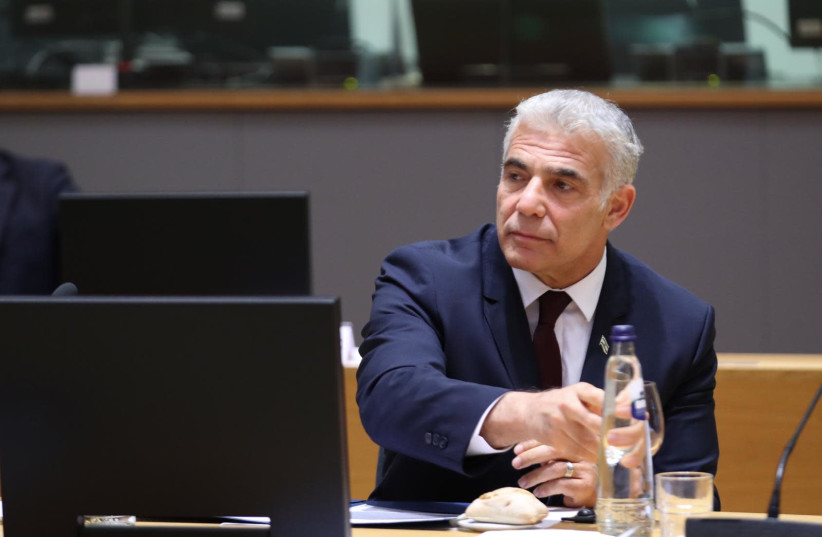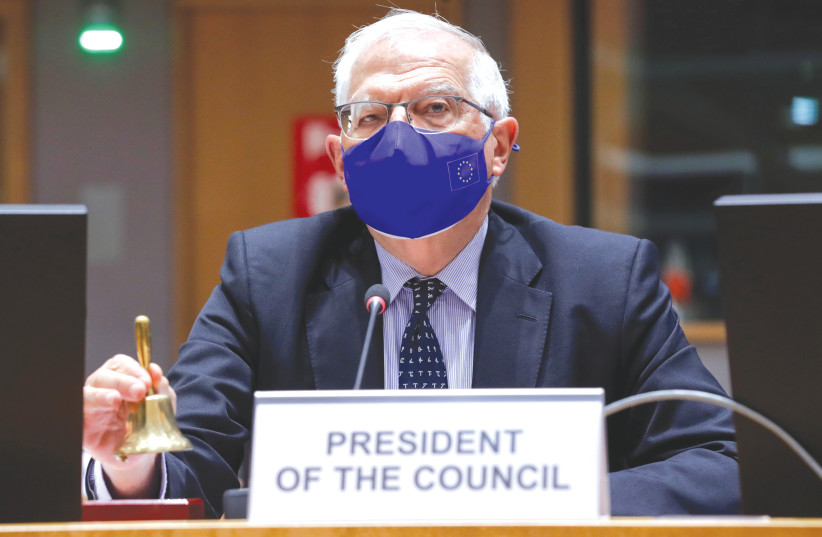Successive Israeli governments have been quite successful in winning some time over the Palestinian issue, while improving or preserving economic achievements and cooperation with the EU.

It is no secret that relations between Israel and Germany have been crumbling in the last two decades. Also, the relationship between former prime minister Binyamin Netanyahu and German Chancellor Angela Merkel is bad, especially since Merkel claims that Netanyahu does not keep his word on various issues. This was also detrimental to the already-strained relationship between the EU and Netanyahu’s government.
The mistrust that existed between Brussels, Berlin and Jerusalem stemmed mostly from Netanyahu’s ethno-nationalist hardline, his government’s reluctance to resolve the Israel-Palestinian conflict, and massive settlement construction in Palestinian territories in the West Bank and east Jerusalem.
However, tensions with Brussels and Berlin about the unsolved Israel-Palestinian conflict did not benefit Israel’s national, security and economic interests. In this context, Merkel was absolutely right to note during her recent visit to Jerusalem that “it is a mistake to base relations between Israel and Germany only on the memory of the Holocaust.”
In the past two decades, the politics of the German guilt and Jewish suffering during the Holocaust ran into a dead end. The politicization of Holocaust remembrance as unique has benefited Israel and Germany for several decades now. The State of Israel and parts of the Jewish world view the genocide of the Jews and the Holocaust as unique or unprecedented in world history.
Surely, the Holocaust was a particularly extreme case of genocide, and a defining moment in Jewish history. However, it was not a unique experience as a human history. It creates a hierarchy of victimhood and distinction of degree, rather than engagement with the victim experience of other groups.

On the other side of the relationship, West Germany, (and since Germany united in 1990) benefited for many years from the largely justified image of a moral beacon. Although the uniqueness debate was coined and developed in Israel, it penetrated the cultural and political arenas in West Germany in the 1950s, where constant questions of guilt drove West German historians to support the uniqueness assertion.
BEYOND HOLOCAUST memory per se, what are Bennett’s government’s benefits for improving the Israel-German relationship?
First and foremost, rapprochement between Israel and the European Union should be a means of improving Jerusalem-Berlin relations. Germany is an important member of the EU, and Chancellor Merkel has often been referred to as the EU’s unofficial leader since the European debt crisis (2009). Thus, the Israeli-EU relations should be a means by which the Israeli-Germans relations can improve – even after Merkel’s retirement. Rapprochement is an Israeli national interest, because trade and cultural exchanges between Israel and the EU may be upgraded as a result.
As noted in a study by the Mitvim Institute, successive Israeli governments have been quite successful in winning some time over the Palestinian issue, while improving or preserving economic achievements and cooperation with the EU. Yet, that will not be enough in near future.
Netanyahu maintained close ties with the populist far-right and anti-liberal Euro-sceptic leaders who are hostile to the EU and Merkel. Hungary’s Viktor Orban, who has served as prime minister since 2010, aligns well with this view. Orban’s relations with Netanyahu may have strengthened both leaders, albeit harming Israel’s economic and cultural interests with EU members that support European integration, and with Merkel in particular.
Israel’s largest trading partner is the EU, whose bilateral trade accounted for 29.3% of its trade in goods in 2020. That year, 34.4% of Israel’s imports came from the EU, while 21.9% of Israel’s exports went to the EU. These included food export, vehicle import, and technological and scientific cooperation.
Nevertheless, the relations are asymmetrical. Specifically, Israel is a minor trading partner of the EU. In 2019 for example, Israel was ranked as only the EU’s 27th trading partner. Israel would benefit from improving its bilateral trading, and creating a bridge to the new government in Germany after Merkel leaves office.
Second, the dividend for improving relations with the EU and Germany is twofold: not only the possible economic gains with increased trading with the EU, but also a reduction in Jerusalem’s dependency on US aid to Israel, as well as improved maneuverability in Washington.
The latter builds upon Bennett’s prior efforts, with his government re-engaging with the Democratic Party and American Jews, as part of the long-standing doctrine that Israel maintain bipartisan relations regardless of which party is in office in Jerusalem or Washington. This doctrine was completely abandoned by Netanyahu during his administration, which was a grave mistake.
Third, improving relations between Israel, Berlin and Brussels could demonstrate to the leading members of the EU that Israel is now more committed to pluralism and social equality. Even though Bennett has clear right-wing positions, and even though important ministers in his government also hold such positions, one of the main features of the Bennett government is the pursuit of gender and social equality: nine female ministers; and an appointment of an Arab-Israeli (Esawi Frej) and a Druze minister (Hamed Amer).

Much remains to be done on this front, but these are the first steps in the right direction. These appointments are the significant steps that align with the values of liberal democracies, and need to be leveraged for diplomatic gains after Netanyahu’s tenure in office.
The continuation of relations between the parties does not have to be based on a zero–sum game; i.e. Bennett’s government’s lack of commitment to the two-state solution does not have to fundamentally mirror the sour relationship between Israel, the EU and Germany.
Diplomatic relations have wiggle room and should be used wisely by Bennett’s government. The measures undertaken can be gradual and measured based on Bennett’s pragmatism, the integration of women in key roles in his government, and the appointment of Arab-Israeli ministers.
As a first step, it is necessary to define relations with the EU, and adopt a more positive discourse about the EU in Israel’s political culture, while also continuing to build a new bridge in the relations with Germany in the post-Merkel era.
As reported by The Jerusalem Post
